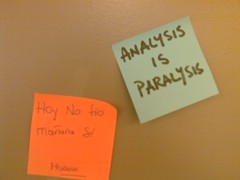| Analysis is Paralysis (Photo credit: Poldavo (Alex)) |
A: Acme XYZ is a scam because of ____, ____, and ____.
B: Acme XYZ works, man. You analyze too much! It's analysis paralysis! Just do it!This is a red herring variant as the argument neither proves the counter-premise or disproves the premise. It is a corollary to the "I get paid" fallacy, in that as long as they person gets paid, any thoughts about it being possibly illegal, to this person, is irrelevant.
There is such a condition called analysis paralysis, or "paralysis by analysis". It is where the analysis process was so onerous and tedious, or the analysis itself takes up so much time and effort, that the final decision was never made. This is sometimes described as "too many what-ifs".
The thing to note here is analysis paralysis is FAILURE TO REACH ANY DECISION.
However, intellectually dishonest debaters will use analysis paralysis metaphor and faulty logic to induce you to make a decision favoring their side.
For example, if the premise is supported by a lot of circumstantial evidence, the debater hoping to support the counter-premise will insist that all the circumstantial evidence is just overanalysis; that if you stop analyzing, you support the counter-premise.
This is absurd, if you think about it. Analysis shows that there is a lot of evidence pointing the OTHER way, that Acme XYZ is a scam. If you stop analyzing, it is still a scam, so why would stop analyzing means you support the counter-premise, that Acme XYZ is NOT a scam?
Which is why this is never used alone, but almost always alongside other red herrings, such as "It paid me" fallacy, "caveat emptor" fallacy, "I know what I am doing" fallacy, and so on. Here's an actual example:
I know too many people earning lots of $ and taking lots out (of this scheme)! If you over analyze you paralyze!To the supporter, if you analyze, you don't make money. It's best to jump in blindly, as long as you make money.
That is just absurd.







No comments:
Post a Comment